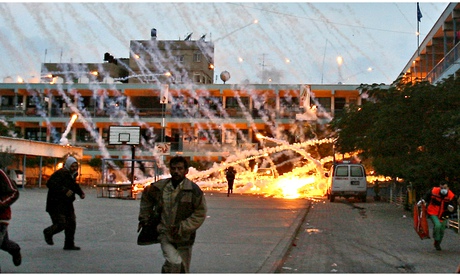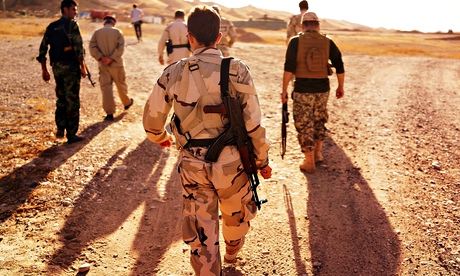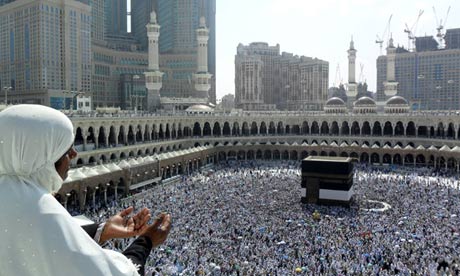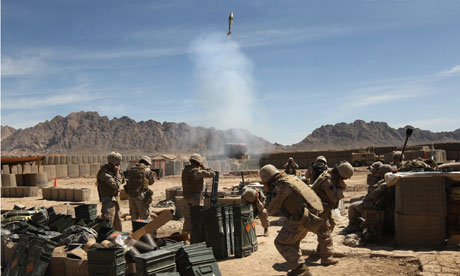Those in power don’t speak of ‘people’ or ‘killing’ – it helps them do their job. And we are picking up their dehumanising euphemisms

To blot people out of existence first you must blot them from your mind. Then you can persuade yourself that what you are doing is moral and necessary. Today this isn’t difficult. Those who act without compassion can draw upon a system of thought and language whose purpose is to shield them – and blind us – to the consequences.
The contention by Lord Freud, a minister in the UK’s Department of Work and Pensions, that disabled people are “not worth the full wage” isn’t the worst thing he’s alleged to have said. I say “alleged” because what my ears tell me is contested by Hansard, the official parliamentary record. During a debate in the House of Lords, he appeared to describe the changing number of disabled people likely to receive the employment and support allowance as a “bulge of, effectively, stock”. After a furious response by the people he was talking about, this was transcribed by Hansard as“stopped”, rendering the sentence meaningless. I’ve listened to the word several times on the parliamentary video. Like others, I struggle to hear it as anything but “stock”.
If we’re right, he is not the only person at his department who uses this term. Its website describes disabled people entering the government’s work programme for between three and six months as “3/6Mth stock”. Perhaps this makes sense when you remember that they are a source of profit for the companies running the programme. The department’s delivery plan recommends using “credit reference agency data to cleanse the stock of fraud and error”. To cleanse the stock: remember that.
Human beings – by which I mean those anthropoid creatures who do not necessarily receive social security – often live in families. But benefit claimants live in “benefit units”, defined by the government as “an adult plus their spouse (if applicable) plus any dependent children living in the household”. On the bright side, if you die while on a government work programme, you’ll be officially declared a “completer”. Which must be a relief.
A dehumanising system requires a dehumanising language. So familiar and pervasive has this language become that it has soaked almost unnoticed into our lives. Those who do have jobs are also described by the function they deliver to capital. These days they are widely known as “human resources”.
The living world is discussed in similar terms. Nature is “natural capital”. Ecological processes are ecosystem services, because their only purpose is to serve us. Hills, forests and rivers are described in government reports as “green infrastructure”. Wildlife and habitats are “asset classes” in an “ecosystems market”. Fish populations are invariably described as “stocks”, as if they exist only as movable assets from which wealth can be extracted – like disabled recipients of social security. The linguistic downgrading of human life and the natural world fuses in a word a Norwegian health trust used to characterise the patients on its waiting list: biomass.
Those who kill for a living employ similar terms. Israeli military commanders described the massacre of 2,100 Palestinians, most of whom were civilians (including 500 children), in Gaza this summer as “mowing the lawn”. It’s not original. Seeking to justify Barack Obama’s drone war in Pakistan (which has so far killed 2,300 people, only 4% of whom have since been named as members of al-Qaida), Obama’s counter-terrorism adviser Bruce Riedel explained that “you’ve got to mow the lawn all the time. The minute you stop mowing, the grass is going to grow back.” The director of the CIA, John Brennan, claimed that with “surgical precision” his drones “eliminate the cancerous tumour called an al-Qaida terrorist while limiting damage to the tissue around it”. Those who operate the drones describe their victims as bug splats.
During its attack on the Iraqi city of Falluja in November 2004, the US army used white phosphorus to kill or maim people taking shelter in houses or trenches. White phosphorus is fat-soluble. Even small crumbs of it bore through living tissue on contact. It destroys mucous membranes, blinding people and ripping up their lungs. Its use as a weapon is banned by the Chemical Weapons Convention, as the US army knows: one of its battle books observes that “it is against the law of land warfare to employ WP against personnel targets” (personnel targets, by the way, are human beings). But never mind all that. The army has developed a technique it calls Shake ‘n Bake: flush people out with phosphorus, then kill them with high explosives. Shake ‘n Bake is a product made by Kraft Foods for coating meat with breadcrumbs before cooking it.
Terms such as these are designed to replace mental images of death and mutilation with images of something else. Others, such as “collateral damage” (dead or wounded civilians), “kinetic activity” (shooting and bombing), “compounds” (homes) and “extraordinary rendition” (kidnapping and torture by states), are intended to prevent the formation of any mental pictures at all. If you can’t see what is being discussed, you will struggle to grasp the implications. The clearest example is “neutralising”, which neutralises the act of killing it describes.
I doubt many people could kill and wound if their language accurately represented what they were doing. It is notable that those who are most enthusiastic about waging war are the least able to describe what they are talking about without resorting to metaphor and euphemism. Few people have nightmares about squashing insects or mowing the lawn.
The media, instead of challenging public figures to say kill when they mean kill, and people when they mean people, repeats these evasions. Uncontested, their sanitised, trivialised, belittling terms seep into our own mouths, until we also talk about “operatives” or “human capital” or “illegal aliens” without stopping to consider how those words resonate and what they permit us not to see. I wouldn’t be surprised if there are dehumanising metaphors in this article that I have failed to spot.
If we wish to reclaim public life from the small number of people who have captured it, we must also reclaim the language in which it is expressed. To know what we are talking about: this, in more than one sense, is the task of those who want a better world.







